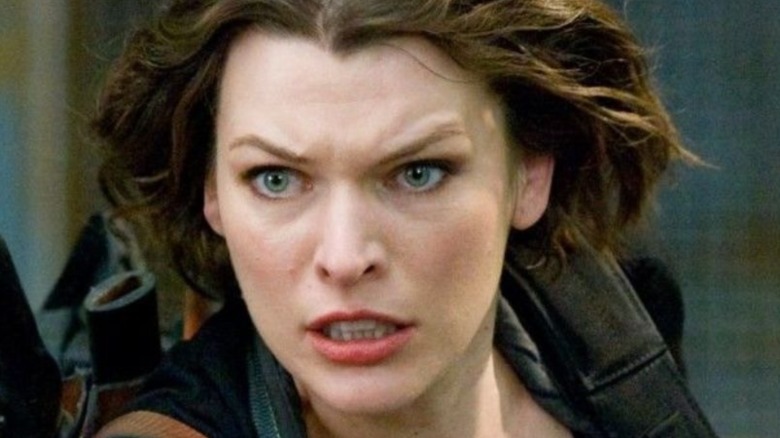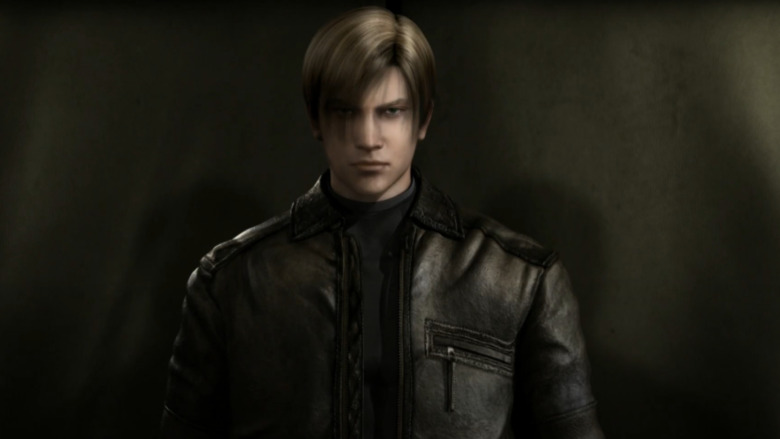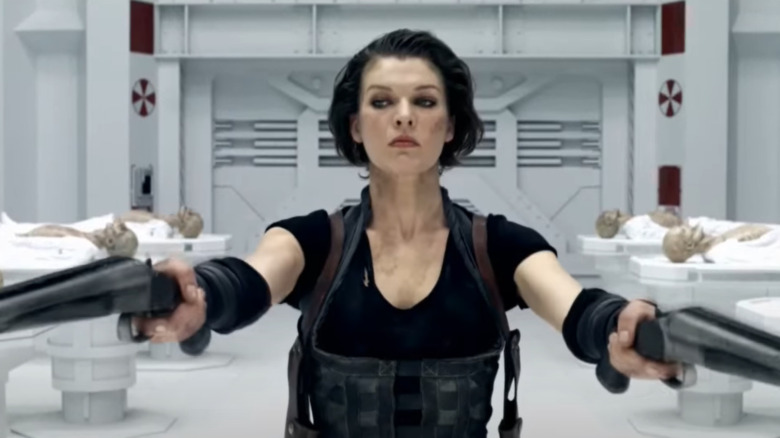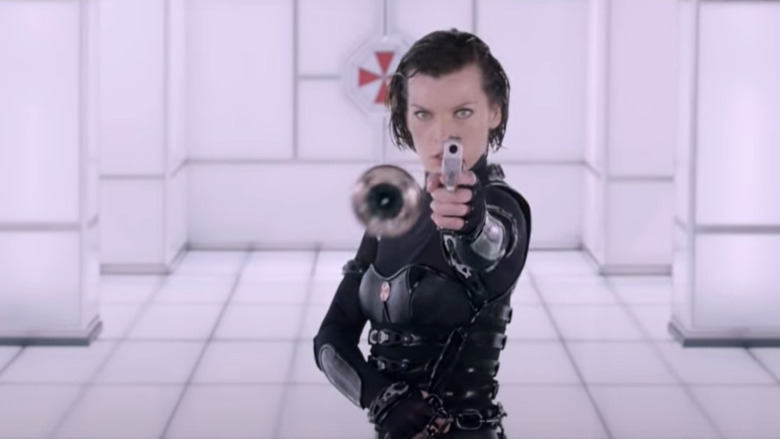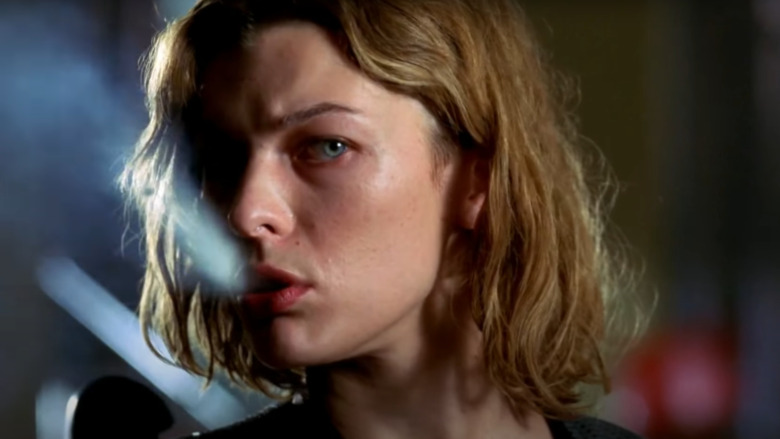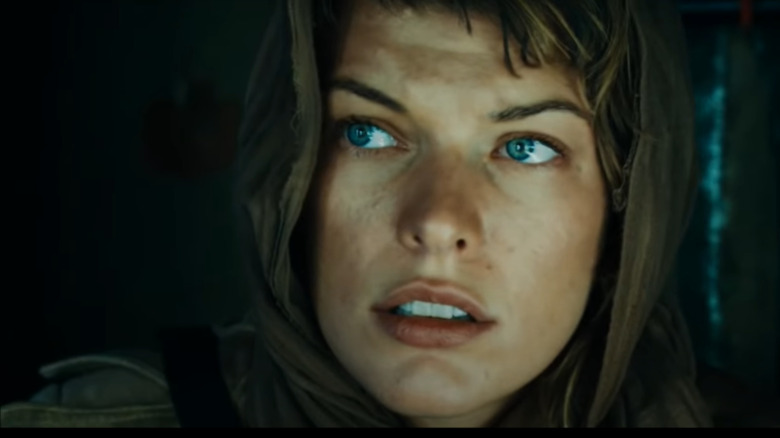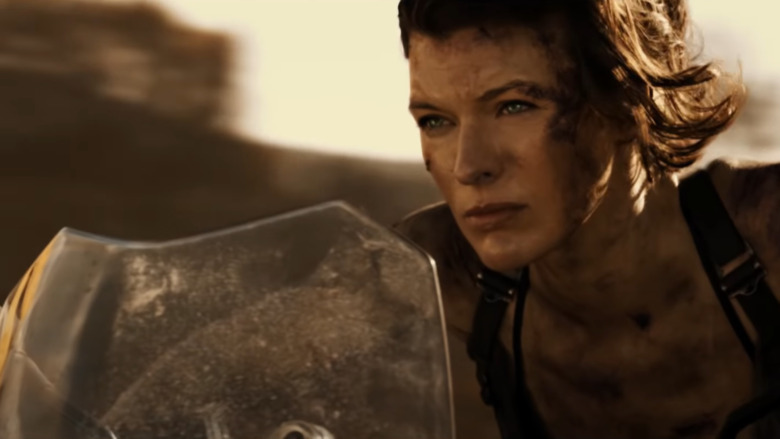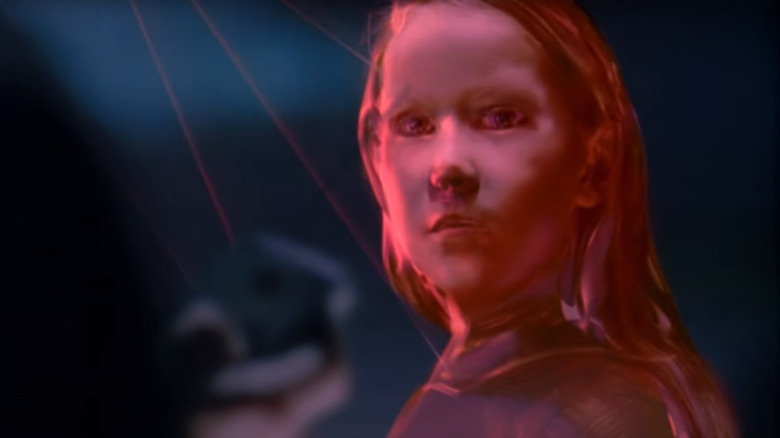Every Resident Evil Movie Ranked Worst To Best
How will history judge the "Resident Evil" films? What standards would you even use? They've made more at the box office than any other cinematic adaptation of a video game, yet they have almost nothing in common with the games they're based on. Their star, Milla Jovovich, plays the same female protagonist in six straight movies, yet you'd never hold up "Resident Evil" as an example of outspoken or progressive filmmaking. With a half-dozen installments that feel increasingly disconnected from one another, these movies can, at their worst, appear to be a soulless attempt to squeeze as much money as possible from an intellectual property that's already past the sell-by date. Yet they also have the feel of a decade-spanning passion project between writer-director-producer Paul W.S. Anderson and Jovovich, who got married between the third and fourth films. They are, in short, a collection of entertaining individual stories so different from one another that coming up with a set of criteria to compare them is an exercise in futility.
And so, we turn to Rotten Tomatoes. We've averaged the critics' and audience score for every "Resident Evil" movie and used those numbers to rank them from worst to best. The results are, we think, fairly representative of the franchise as a whole. We're also about to spoil the whole series, so if that bothers you, proceed with caution!
Honorable mention: Degeneration, Damnation, and Vendetta
There are three feature-length "Resident Evil" films that are CGI-animated, but they have as little to do with the Anderson-Jovovich movies as those moves have to do with the "Resident Evil" games. In fact, the animated films are directly linked to the games: 2008's "Degeneration" is set sometime after "Resident Evil 4," 2012's "Damnation" is a direct prequel to the video game "Resident Evil 6," and 2017's "Vendetta" is set between "Resident Evil 6" and "Resident Evil 7." Though they're Japanese productions, all three movies are in English with primarily American voice actors, so there's no language barrier for English-speaking fans of the games who want to know as much about the over-arching "Resident Evil" narrative as possible.
Technically, these animated movies are the most critically acclaimed "Resident Evil" movies around, according to Rotten Tomatoes. But don't be fooled: Their lofty scores are made up of a mere handful of reviews each. Generally, the reception to them has been mixed — your mileage will likely depend on how invested you are in the story being told by the video games, and your tolerance for, as Den of Geek describes them, "90 minute [cutscenes]." As movies based on "Resident Evil," we feel they deserve a mention. But let's be clear: The animated versions of Claire and Chris Redfield, Leon Kennedy, and Ada Wong have no bearing on their live-action counterparts, and the trilogy has no place in the bizarre universe crafted by Anderson and Jovovich.
6. Afterlife (2010)
If you cut off the beginning and end of the fourth "Resident Evil" film and sever it from the rest of the franchise, you actually have a pretty decent movie. "Afterlife" is the second-highest grossing "Resident Evil" film, which makes sense — the previous one ends with an army of Alice clones about to descend on the Umbrella Corporation. Unfortunately, "Afterlife" doesn't deliver the goods. The clones' attack on Umbrella begins and ends in the first few minutes, the clones are destroyed, and Alice loses her superhuman abilities. "Afterlife" then becomes a fairly assembly-line zombie movie, with a group of survivors trying to escape a building besieged by the undead while also battling the worst parts of human nature. It's good for what it is, but it doesn't deliver on past promises.
Even more frustrating is the fact that Anderson can't let his movies just end. "Afterlife" in particular has a great natural ending that sees Alice and her friends in command of a huge, zombie-free boat, preparing to travel around the world providing a refuge for survivors. It's a fantastic premise for a sequel ... and it's immediately swept away by its own final scene, in which Umbrella troops descend on the ship and let us know that none of that is actually happening. As a result, "Afterlife" becomes the platonic ideal of a "Resident Evil" movie: A surprisingly good stand-alone film that crumples under the weight of the larger franchise.
5. Retribution (2012)
"Afterlife" ranks low because it fails to deliver on high hopes. The film that follows it never even has the chance to disappoint.
"Retribution" is a nonsensical and cringe-worthy demonstration of what happens when you try to fold the disparate pieces of "Resident Evil" film continuity into a cohesive whole. Claire Redfield is gone, along with her brother, Chris, who finally showed up in "Afterlife," only to disappear entirely. In fact, aside from Luther West (who dies in the final fight scene, making Alice 0-for-3 on potential love interests) the only character from "Afterlife" who does return is Albert Wesker, even though the last time we saw him, he was getting vaporized. "Retribution" has no interest in explaining this, or why Wesker is suddenly on Alice's side, apart from some weak plot development about the Red Queen from the first movie being the real villain behind everything.
In many ways, "Retribution" is 95 minutes of the franchise's worst tendencies. The clone storyline crumbles into an excuse to bring Michelle Rodriguez and Colin Salmon back. The sub-plot of Alice adopting a little clone girl is heart-warming, but tonally incongruent. The final shot of Alice standing beside Jill Valentine, Leon Kennedy, and Ada Wong is retroactively hilarious, considering that none of them appear in "The Final Chapter." There's no secret good movie hidden inside "Retribution" — it's just a muddled sludge of fanservice and callbacks that don't make sense and nobody asked for.
4. Apocalypse (2004)
The first "Resident Evil" sequel walks a fine line between linking up with the events of its predecessor and being nothing at all like it. "Resident Evil" is a densely-plotted survival film that makes effective use of the "protagonist with amnesia" trope while following the tried-and-true horror formula of whittling down a large group of people. "Apocalypse" takes a hard left turn into the action movie genre, cementing Alice's role as the franchise's butt-kicking heroine. It also sacrifices the first film's claustrophobic feel for an open environment with higher stakes and bigger guns to match. To be fair, this is a logical progression of previous events: "Resident Evil's" final scene suggests that a wider scope was always the plan, and "Apocalypse" does a good job of expanding on previous plot points, including Alice's fighting skills, Matt Addison's transformation into Nemesis, and the origins of the Red Queen. Plus, it manages to do this while also introducing compelling new characters like Oded Fehr's Carlos Oliveira.
The downside to all this is that "Apocalypse" stumbles into numerous pitfalls of the action genre. It's campy, often to the point of silliness, with largely mediocre acting and a frustrating dependence on stereotyping. But if you can get past that, there are several surprisingly moving moments of humanity in the film. And hey, at least Mike Epps' L.J. Wade and Oliveira survive (in this movie, anyway), making it the only "Resident Evil" installment where two characters of color live to see the end credits.
3. Extinction (2007)
The first three movies in the "Resident Evil" franchise feel significantly more like a unified story than the last three. By the end of "Extinction," it feels like things have come to a logical climax, with a big payoff coming in the fourth film. That doesn't happen, but that's what it feels like will happen, and that's a positive. Still, it would be inaccurate to suggest that "Extinction" doesn't bear the seeds of the franchise's devolution: Like later "Resident Evil" films, it opens by completely blowing up the previous installment's status quo, depicting a solitary Alice navigating a post-apocalyptic wasteland even though we last saw her escaping an Umbrella facility with the help of her friends. (It's doubly weird, because Fehr and Epps both reprise their characters and run into Alice later in "Extinction," anyway.) This disconnect is highlighted by the fact that the sinister Umbrella scientist who deliberately lets Alice go in the final scene of "Apocalypse" is now suddenly desperate to get her back, and spends the whole third movie trying to do so.
That said, "Extinction" is a fun, "Mad Max" style action flick that puts a totally different spin on the series (our heroes are mobile instead of trapped) while still mostly painting inside the lines of continuity. Ali Larter is a welcome addition as Claire Redfield, and Iain Glen is by far the best villain in "Resident Evil" history, which is probably why Anderson contrived to bring him back for "The Final Chapter."
2. The Final Chapter (2016)
This "Resident Evil" movie achieved the franchise's highest critic score on Rotten Tomatoes, and its biggest box office haul. It's the best-looking film of the bunch, with vastly improved special effects (though the annoyingly hyperactive editing makes it nearly impossible to watch at times). It's also the most thematically ambitious film: "The Final Chapter" actively makes a statement about how, in the face of social and environmental collapse, rich people will hide away in their bunkers and let humanity die. Meanwhile, the revelation of the central triple-goddess character in the form of Alice, Alicia Marcus, and the Red Queen gives Alice some much-needed depth. It also contributes to the unavoidable observation that the protagonists of "The Final Chapter" are all women, while the antagonists are all men.
Unfortunately, "The Final Chapter" is also the peak of the series' inclination to ignore the events of earlier films. The traditional "previously on Resident Evil" exposition sounds like it comes from somebody who's never seen the movies: Wesker is evil again, the Red Queen is good now, all the surviving non-Alice heroes are gone without mention, and even the origins of the T-Virus have been brazenly retconned. The last movie is really only interested in lining up with the first one, returning to the Hive and the dropped plot thread about an antivirus. Having seen the four films in between adds almost nothing to the experience — a twisted irony for a movie entitled "The Final Chapter."
1. Resident Evil (2002)
Critics might prefer "The Final Chapter," but the highest audience score goes to the first "Resident Evil" movie. A tense, disturbing horror film, it's anchored by a well-constructed script, solid performances from Jovovich and Rodriguez, and a score by Marilyn Manson. Looking back, using almost nothing from the existing plot of the video games was probably the right call. What the games did contribute is far more important: Specifically, the idea of using zombies to explore the terror of biological weaponry and the self-destructive nature of corporate greed. To this, Anderson adds further exploration of moral questions surrounding quarantine procedures and artificial intelligence. There aren't even any zombies in "Resident Evil" until halfway through, as the film is far more concerned with slowly unlocking the mystery of the main characters' identities. When the zombies do show up, they're terrifying, though even the monstrous "licker" proves a less iconic villain than a simple laser grid.
Most importantly, the original "Resident Evil" film largely stands on its own, not yet swept up in the maelstrom of contradictory continuity that the series goes on to get lost in. Anderson still can't nail the ending, which prioritizes sequel set-up above all else, but that doesn't detract from the breathtaking horror of Alice walking into the destroyed Raccoon City in the film's final shot. While ensuing movies attempt to recapture the magic, nothing beats that first utterance of "You're all going to die down here."
